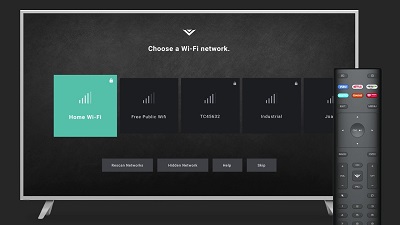Connecting to the Internet with your Vizio TV isn’t as difficult as it seems. Often, the problem you have is more to do with your Internet connection or your Internet hub than your TV. Nevertheless, this article explains how you connect your Vizio TV to the Internet.
In addition, we’ll show you how to connect to the Internet through your home Wi-Fi and with an Ethernet cable. This will include step-by-step instructions on which buttons to press and which menu functions to choose. If you still have trouble connecting after reading this article, then it may be a manufacturer fault within your TV itself.
Connecting to a Wi-Fi Network at Home
You can plug an Ethernet cable into the back of your TV and receive the Internet that way, or you can connect to the Internet using your home Wi-Fi. Here’s how you use your home Wi-Fi to connect.

- On the top right corner of your remote is the “Menu” button. Press it.
- Up pops your menu screen on your TV.
- Find the “Network” function, select it, and press the “OK” button on your remote.
- Find the “Network Connection” function, select it and press “OK.”
- There should be a wireless function. Find it, select it and press the “OK” button.
- You will see a list of available Wi-Fi networks on your screen.
- Select your own Wi-Fi network and press “OK.”
- This brings up your password function. Add in your Wi-Fi password.
- Confirm your password and press the enter button on your menu (it may also show as “OK”).
You should now see a confirmation screen. It will show that your TV has connected to the Internet. You can test it by visiting a site like YouTube.
Connecting by Wire to the Internet
Start by plugging the Ethernet cable into your TV, and making sure it’s connected from your Internet hub. The image below shows an Ethernet port that has been labeled. Your TV will look similar to this, except the ports may be a little more spread out rather than being bunched together.

- Press the “Menu” button on your remote
- Find the “Network” function, select it and, press the “OK” button.
- Select “Wired Network.”
- It may then connect in a few seconds without any further action from you.
- If it doesn’t, you may have to enter a password.
- If it doesn’t, you may have to select a confirmation button in the menu you’re looking at.
- Once connected to the Internet, a confirmation message will appear.
Connecting via the wire is often more difficult, for some reason, so you may have to go online to see how other people have overcome the most common problem.
Resetting Your TV to Factory Settings
If all else fails, you may want to reset your TV to factory settings. That way, if your TV’s current settings are causing the problem, then a factory reset will resolve the issue. Still, don’t take this option lightly. It’s a last resort; something you should do after you’ve tried many other solutions.
- You can reset your TV by pressing the “Menu” button on your remote.
- Find the setting called, “System,” select it with the arrows on your remote, and then press the “OK” button.
- Go to “Reset” and go into it.
- Then go to “Admin” and go into it with the “OK” button.
- You will see a function called “Reset TV to Factory Defaults.”
- You will now need to select “Reset” one more time, and your TV will reset to its factory defaults.
It’s possible that a factory reset will fix your problem, but many times it’s your Internet connection itself. For example, it may not be sending any Internet through the Ethernet cable. It may also be very slow if the connection to your home Wi-Fi is weak. Try looking online before you go to the customer support for Vizio because they’re going to take you through all the steps like telling you to check to see if the power is on, if the wire is damaged, and so forth. It gets a little frustrating, especially after you’ve been waiting on hold for tens of minutes.
Check Your Hub Too
If you’re still having trouble connecting to the Internet, then consider blaming your Internet connection or your hub. Try plugging in the wire, and then turning your hub off, waiting a couple of minutes, and then turning it on again. Also, once you’ve selected the wired connection, you can try pulling the cable from the back and reconnecting it again. Before you start toggling DHCP settings, you should probably consult your TV seller or manufacturer for advice.
Did our answer help? Are you still having troubling connecting? Did you find the answer yourself? Let us know in the comments section below.
Disclaimer: Some pages on this site may include an affiliate link. This does not effect our editorial in any way.





![How to Manage Subtitles for CBS All Access [All Major Devices]](https://www.alphr.com/wp-content/uploads/2020/06/How-to-Manage-Subtitles-for-CBS-All-Access-All-Major-Devices-302x190.jpg)
![How to Manage Subtitles for Amazon Prime Video [All Major Devices]](https://www.alphr.com/wp-content/uploads/2020/06/How-to-Manage-Subtitles-for-Amazon-Prime-Video-All-Major-Devices-302x190.jpg)